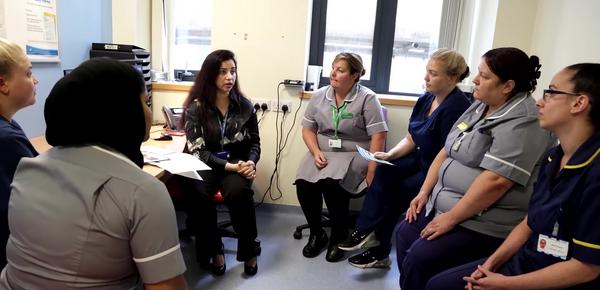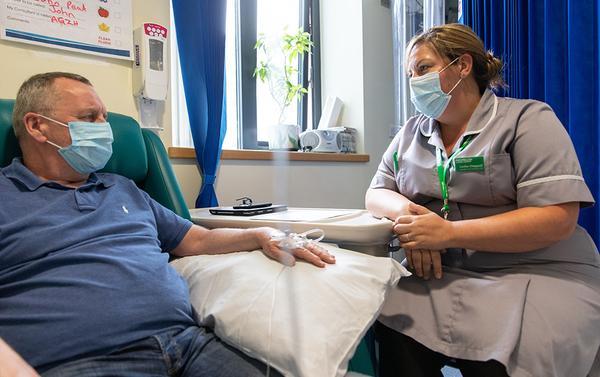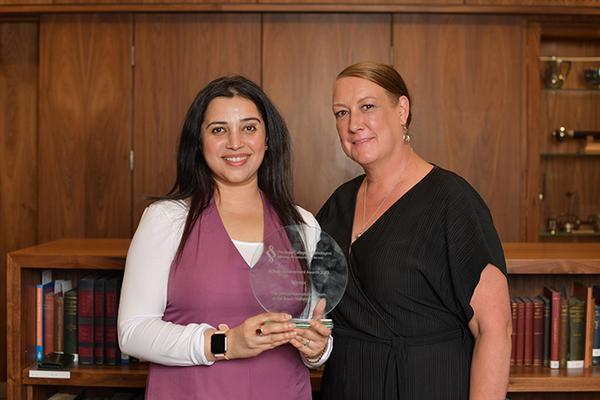Would you like to start by introducing yourself and giving us a bit about your pathology background?
I am a Consultant Haematologist and Cancer Lead for Haematology at Northern Care Alliance (NE Sector) and Honorary Senior Lecturer at Manchester University. My areas of interest include myeloma and venous thromboembolic diseases. I am the National Speciality Lead for Haematology, NIHR, and I'm extensively involved in trial delivery. I have multiple publications in peer-reviewed journals and am a coauthor for multiple national guidelines (British Society for Haematology). I am involved in various collaborative projects focusing on improving cancer service delivery, and I am also the Vice Chair of the British Society of Haematology Annual Scientific Meeting.
I have led projects that have received the prestigious National HSJ award, RCPath Achievement Award, National Macmillan Excellence Award, and Greater Manchester Cancer Quality Improvement Award.
Can you tell us why you decided to work in haematology?
I elected to pursue a career in haematology because it offers a diverse clinical exposure, ranging from specialised domains like cancer treatment to more generalist areas like anaemia assessment and the management of haemostasis and thrombosis-related issues.
This amalgamation provides an ideal blend of hands-on patient interaction across ward and outpatient settings and academic laboratory-based roles. It is a unique specialty that encompasses all these facets under a single umbrella, making it unparalleled in its scope.

How would you describe your average working week?
My day usually commences at 8 am. I divide my time between the hospital laboratory, where I interpret test results for my patients and others across the hospital, and attending the wards and outpatient department clinics, where I care for patients with blood disorders.
Typically, my mornings begin with outpatient consultations, followed by formal ward rounds or day unit visits in the afternoons to discuss diagnoses and treatment plans. Additionally, as the department's MDT lead, I ensure adherence to evidence-based practice. My role also involves participating in clinical trials by recruiting patients and mentoring junior doctors in the specialty.

You have been recognised for your at-home chemotherapy treatment model. Can you tell us a bit about its creation and how it has changed the distribution of treatment?
In 2022, we pioneered a Chemotherapy at Home model, training Macmillan nurses to administer azacitidine, a haematological cancer treatment, in patients' homes, eliminating 100 hospital visits per patient and saving 540 chair minutes per treatment cycle.
This increased clinic capacity by 20 patients/week, saving £350 per patient in clinic tariffs. The cost savings of £7,200 were annually compared to private sector quotes of £67,000 to £70,000, ensuring financial viability and continuity of care. This also negated the inherent risks associated with outsourcing, providing a secure and cost-effective solution.
The key to this transformative approach was a shared vision with the nursing team to address a significant challenge faced by patients, who previously had to endure the strain of travelling to overcrowded day units, often resulting in refusal to undergo necessary therapy.
In 2022, we pioneered a Chemotherapy at Home model, training Macmillan nurses to administer azacitidine ... eliminating 100 hospital visits per patient and saving 540 chair minutes per treatment cycle.
My effective communication and stakeholder engagement were pivotal in driving the adoption of the novel treatment model. Additionally, this empowered the Macmillan team to expand their skill set, thereby enhancing patient-centred care delivery. This led to model adoption by more than 50 trusts, with patients providing highly positive feedback, as evidenced in the Oldham Chronicle news article. In 2023, this project won the RCPath Achievement Award, a testament to its positive impact on patient care.

Can you tell us some of the team's other achievements?
We introduced an innovative initiative teaching patients to self-administer Velcade chemotherapy for myeloma, a malignant condition. This was specifically developed to prevent treatment compromise during the pandemic. Over 9 months, 23 patients utilised this programme, reducing their visits from 32 to 8 per cycle, saving 1,000 minutes per treatment, and reducing costs by £51,008, demonstrating remarkable efficiency.
The key to this transformative approach was a shared vision with the nursing team to address a significant challenge faced by patients, who previously had to endure the strain of travelling to overcrowded day units...
Patient surveys continue to reveal overwhelming satisfaction, lauding its quality. Our pioneering efforts were recognised by ITV Granada, showcasing our dedication to innovative cancer care. This project won the national HSJ Improving Care for Older People Initiative of the Year Award in 2021, the National Macmillan Professionals Excellence Award in 2022, and the Greater Manchester Outstanding Care accolade in 2022.
What advice would you give someone who wants to work in haematology?
It is uncommon to encounter a haematologist who regrets their choice of specialisation. The rigorous training and demanding FRCPath examinations are indeed challenges. Nonetheless, the specialty remains perpetually captivating. Haematologists are often characterised as 'nerdy', a reputation not entirely unfounded, as a commitment to lifelong learning remains pivotal.
I elected to pursue a career in haematology because it offers a diverse clinical exposure ... an ideal blend of hands-on patient interaction across ward and outpatient settings and academic laboratory-based roles.
During their training, many haematologists choose to pursue research, but this is not a requirement. What's more, the field is evolving, and there is a growing recognition that clinical research is just as valuable as laboratory research. As a result, numerous institutions now offer research opportunities for trainees interested in both aspects of haematology.

